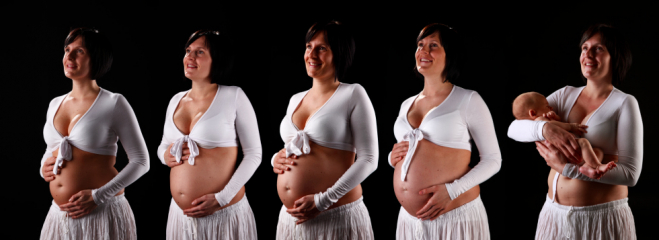Breastfeeding: first few days
In the first few days, you and your baby will be getting to know each other. It may take time for both of you to get the hang of breastfeeding.
Before the birth

It’s good to find out as much as you can about breastfeeding before the birth. Knowing what to expect should help you feel as confident as possible when you've just given birth and want to breastfeed your baby.
Antenatal sessions, whether held by the NHS or another organisation, should cover the most important aspects of breastfeeding, such as positioning and attachment, expressing, common questions and concerns, and how to overcome them. You can find out more from your midwife, from family and friends, and useful helplines and websites.
There are lots of groups and drop-ins, some specially designed for pregnant women who want to know more about breastfeeding. You can find out more by asking your midwife, health visitor, local peer supporter or GP. Or visit your local Children’s Centre.
Immediately after your baby is born
Having skin-to-skin contact with your baby straight after the birth will help to keep your body warm, calm your baby, and help with the first breastfeed.
Every pregnant woman makes milk for her baby, which is ready and available at birth. This milk is called colostrum and is sometimes a yellow colour. It's very concentrated, so your baby will only need a small amount at each feed (approximately a teaspoonful). Your baby may want to feed quite frequently, perhaps every hour. But they will begin to have longer feeds less often when your milk comes in, in a few days. The more you breastfeed the more milk you'll produce. The time between feeds will vary, and you and your baby will settle into a pattern, which may change from time to time.
How often will my baby feed?
All babies are different, and it may depend on the type of birth you've had. Your baby should feed within the first hour after birth to get off to a good start. Babies then sometimes have a sleep and will start to give you signs that they're ready for the next feed. These signs include:
- starting to move about as they wake up
- moving their head around
- finding something to suck, usually their fingers
Building up your milk supply
Around two to four days after birth you may notice that your breasts become fuller and warmer. This is often referred to as your milk ‘coming in’. Your milk will vary according to your baby’s needs. It will look thin compared with colostrum, but gets creamier as the feed goes on.
Each time your baby feeds, your body knows to make the next feed. The amount of milk you make will increase or decrease depending on how often your baby feeds. In the early days, ‘topping up’ with infant formula can decrease your milk supply.
Feed your baby as often as they want. This is called baby-led feeding (it's also known as 'on-demand'). Let your baby decide when they’ve had enough. It's not necessary to time the feeds. In the beginning, it can seem that you're doing nothing but feeding, but gradually, you and your baby will get into a pattern of feeding, and the amount of milk you produce will settle.
It's important to breastfeed at night because this is when you produce more hormones (prolactin) to build up your milk supply. At night, your baby will be safest sleeping in a cot in the same room as you.
The let-down reflex
Your baby’s sucking causes milk stored in your breasts to be squeezed down ducts towards your nipples. This is called the let-down reflex.
Some women get a tingling feeling, which can be quite strong. Others feel nothing at all. You'll see your baby respond, and their quick sucks will change to deep rhythmic swallows as the milk begins to flow. Babies often pause after the initial quick sucks while they wait for more milk to be delivered. If your baby seems to fall asleep before the deep swallowing stage check they’re effectively attached.
Sometimes you'll notice your milk flowing in response to your baby crying or when you have a warm bath or shower.
Leaking breast milk
Sometimes, breast milk may leak unexpectedly from your nipples. Press your hand gently but firmly on your nipple when this happens. This usually helps very quickly. Wearing breast pads will stop your clothes becoming wet with breast milk.
Help and support
If you're very uncomfortable or sore, ask for help. Midwives, health visitors and trained volunteers can offer information and practical help with breastfeeding. Talk to your midwife or health visitor about the information and support available in your area.
Contact the National Breastfeeding Helpline.
Other breastfeeding support organisations and useful websites








